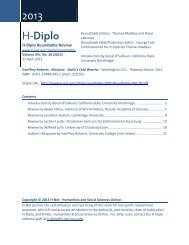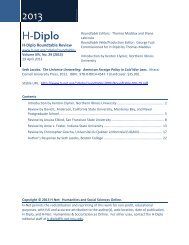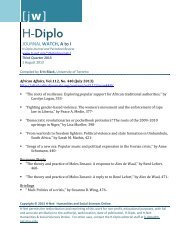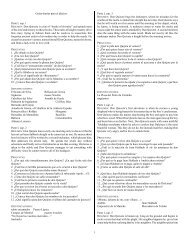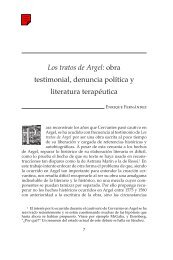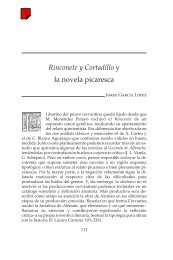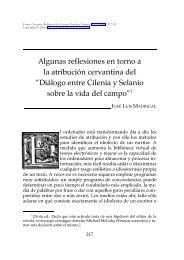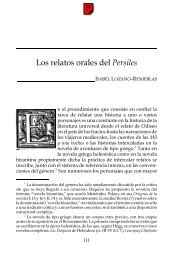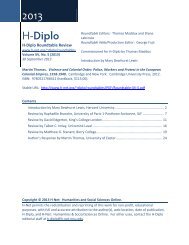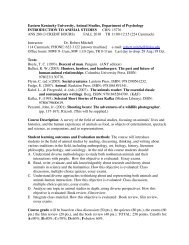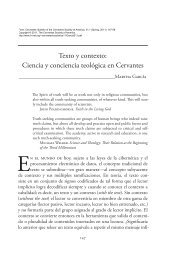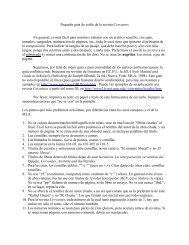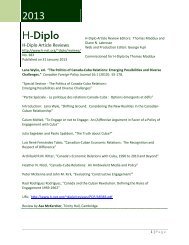The Function of Skepticism in Part I of Don Quijote - H-Net
The Function of Skepticism in Part I of Don Quijote - H-Net
The Function of Skepticism in Part I of Don Quijote - H-Net
Create successful ePaper yourself
Turn your PDF publications into a flip-book with our unique Google optimized e-Paper software.
Volume 30.2 (2010) <strong>The</strong> <strong>Function</strong> <strong>of</strong> <strong>Skepticism</strong><br />
117<br />
contrast between the skeptical story and <strong>Don</strong> <strong>Quijote</strong>‘s dogmatic character<br />
can be appreciated more easily.<br />
<strong>Skepticism</strong> and the Story <strong>of</strong> <strong>Don</strong> <strong>Quijote</strong><br />
<strong>The</strong> prologue conta<strong>in</strong>s an explanation <strong>of</strong> the problem fac<strong>in</strong>g the author:<br />
he is unsure what the “antiguo legislador que llaman vulgo” (13) will say<br />
about him and his book because <strong>of</strong> several reasons: the book has no erudition;<br />
it does not quote from Aristotle nor Plato; it does not appeal to<br />
Aqu<strong>in</strong>as nor the holy scripture; it does not have a list <strong>of</strong> authors that ends<br />
with Xen<strong>of</strong>onte, or Zolio or Zerxius (13); and it does not have at the beg<strong>in</strong>n<strong>in</strong>g<br />
poetry written by important people such as “duques, marqueses,<br />
condes, obispos, damas o poetas celebérrimos” (14). In short, the author<br />
is worried about the reception <strong>of</strong> the book by the “vulgo” because it lacks<br />
authority. <strong>The</strong>n we are told the solution. A friend who is unknown (and<br />
therefore lacks authority) proposes the follow<strong>in</strong>g: <strong>in</strong>vent the sonnets and<br />
claim that they were written by important people (for example, “Preste<br />
Juan” (15)); use the quotes that you already know and are easy to remember<br />
and place them strategically throughout the book, mak<strong>in</strong>g sure that<br />
they have authority (“Horacio”, “Escritura Div<strong>in</strong>a”, “Catόn” (15-16)); with<br />
respect to the annotations, <strong>in</strong>clude them us<strong>in</strong>g the same strategy, cit<strong>in</strong>g<br />
even more authorities such as “Ovidio . . . Homero . . . Virgilio . . . Julio<br />
César . . .Plutarco . . . Leόn Hebreo” (17); with respect to the list <strong>of</strong> authors,<br />
take it from another book and put it at the end <strong>of</strong> the book so that<br />
it gives “de improviso autoridad al libro” (18).<br />
In addition to the solution, the friend expla<strong>in</strong>s why the book needs<br />
no authority: “este vuestro libro no tiene necesidad de n<strong>in</strong>guna cosa de<br />
aquellas que vos decís que le falta, porque todo él es una <strong>in</strong>vectiva contra<br />
los libros de caballerías, de quien nunca se acordó Aristóteles, ni dijo<br />
nada San Basilio, ni alcanzό Cicerón” (18).<br />
Later on, to avoid long subjects, he will merely use the expression “dogmatism” to refer to<br />
all <strong>of</strong> them at once: “… and other th<strong>in</strong>gs, connected with the dogmatists’ pedantry, tend to be said<br />
aga<strong>in</strong>st such def<strong>in</strong>itions” (8).<br />
All the experts who have studied skepticism before the Enlightenment recognize the basic<br />
connection between that philosophy and the production <strong>of</strong> a happy life, such as for example,<br />
Peter Lom (2001), Marcelo de Araujo (2003) and John C. Laursen (1992).



